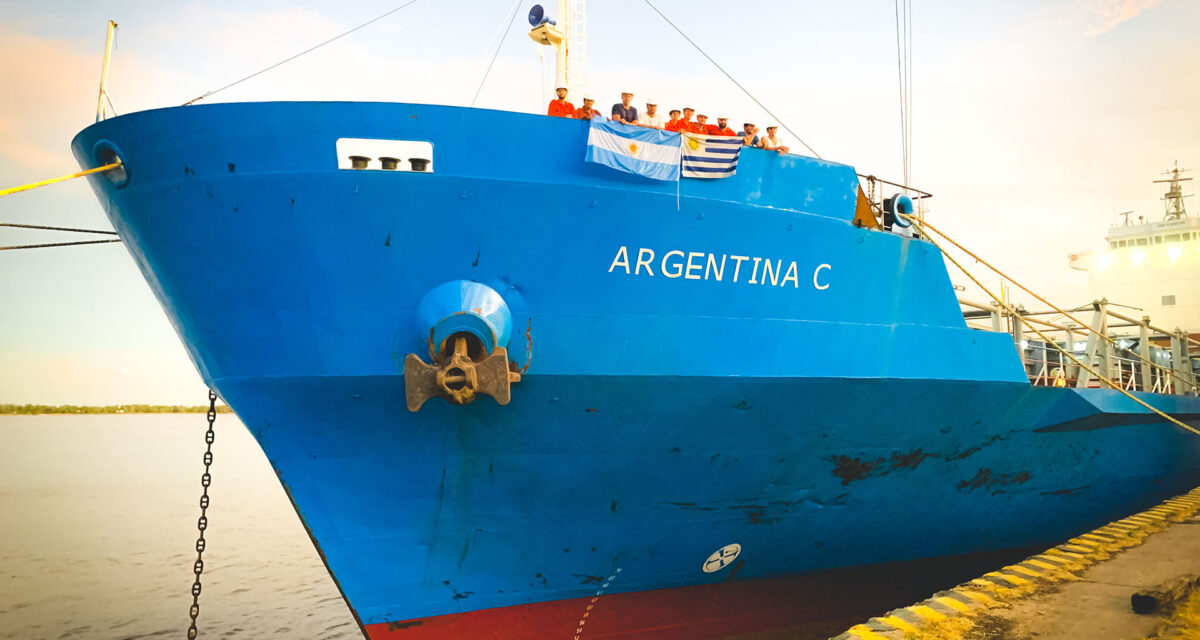Circular
Servirio`s News
MERCHANT MARINE: THE GOVERNMENT IS ALREADY PREPARING URGENT TAX MEASURES TO BOOST THE SECTOR

The Minister of Transport met with managers of shipping companies and union representatives. They will work in technical tables.
The Nation’s Minister of Transportation, Alexis Guerrera, assured that the recovery of the merchant marine must be a priority and showed himself strong enough to “give whatever fight is necessary” to reinvigorate the sector.
The national government listened to the claims of businessmen and unions due to the terminal crisis that the merchant marine is going through and is preparing emergency measures to revive the sector and prevent more leaks of ships to other countries, with lower costs in the transfer of cargo through the Waterway Parana.
It is clear that the organized unions were the ones that made the problem visible through a measure of force. But on the other hand, 50 percent of the historical cost overrun of Argentine ships is made up of the current labor regime. How will the National Government unwind this mess?
The crisis became visible at the end of 2021, when the Maruba company decided to change the flag of the Piray Guazu vessel to Paraguay and the Union of United Maritime Workers (SOMU) and the Center of River Skippers and Officials tried to block the departure with a measure of force, which was extended to tankers that supply fuel to thermal power plants. Finally, the ship sailed, the Paraguayan crew boarded in Corrientes and then the Ministry of Labor issued a conciliation to guarantee Cammesa the supply of diesel and fuel oil.
Faced with this very serious situation and after the complaints made by trade unionists in conjunction with the CGT and the CATT, the Government took action on the matter. On Monday, the Nation’s Transport Minister, Alexis Guerrera, met separately with directors of Argentine shipping companies and trade unionists to begin to unravel the crisis.
In these meetings, between face-to-face and virtual, the conclusion was reached that the situation is terminal and that measures must be taken as soon as possible. For this reason, by mandate of Guerrera, workshops will be opened this week and the next with national officials, technical staff, trade unionists and national businessmen to define the best solutions.
Trade unionists and businessmen told Guerrera that the Merchant Marine should be, like in other countries, a “priority” of the national State and they warned him about the weakness of taking measures “patch after patch”, because “they do not work”. One of them recalled that Maruba, the shipping company that took the Piray Guazu to cut costs, had a fleet of 50 ships. The minister replied that it should be a priority for him and showed himself strong enough to “put up the fight that is necessary,” the witnesses said.
“If it depended on him, it would be quite a fact, but he clarified that a fight should be fought with the different Ministries that correspond,” said another guest, because maritime regulations go through various state agencies such as the Ministry of Economy, Productive Development, Customs and AFIP.
The urgent measures being analyzed
Regarding the merchant marine in particular, the alternative of setting a progressive percentage of cargo reserve for national flag vessels and tax benefits similar to those applied to mining is analyzed. It would start with a minimum of 5% mandatory load for Argentine vessels, with a reduction in costs with the reduction of VAT, Gross Income and Check Tax, for example.
“The first impact should be small, with a progressive board. Foreigners cannot be charged anything, you have to be competitive and show that you are reliable. We must have regulations that respect the Argentine flag and that give strength to the national merchant marine, but that resist global circumstances”, summed up an important player in the commercial marine.
In order to repatriate the “runaway” ships in the new regulations, it should be considered that the final beneficiary of the cargo reserve is a company with national capital, and not a local corporation created by foreigners, who then send their profits to the parent companies. .
Currently, just because of the current labor regime, Argentine ships are 50% more expensive than Paraguayan or Panamanian ships, to which is added VAT on fuel and other taxes on wealth, while in Paraguay between 7% and 9% for all concepts. In Argentina today the cost of transporting merchandise by river is more than double that of other countries.
Another aspect that could be taken into account is the launch of new subsidized lines of credit for the purchase of new vessels or the repair of existing ones. The Merchant Marine Law 27,419 sanctioned on November 29, 2017 and enacted on December 21, 2017 included improvements in naval credit, through maritime privileges and the naval mortgage. However, despite the fact that the Central Bank at that time improved the qualification of the naval mortgage as a Class B Preferred Guarantee, today it is in a seventh step and the financing does not exist.


